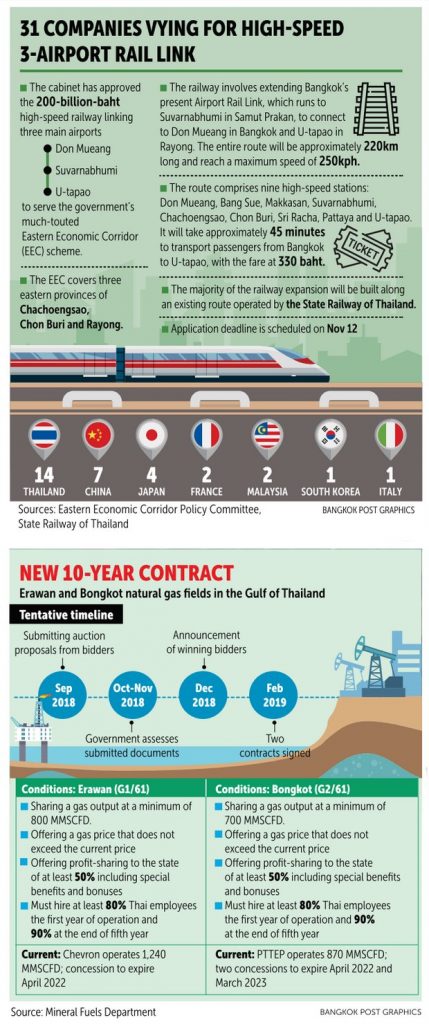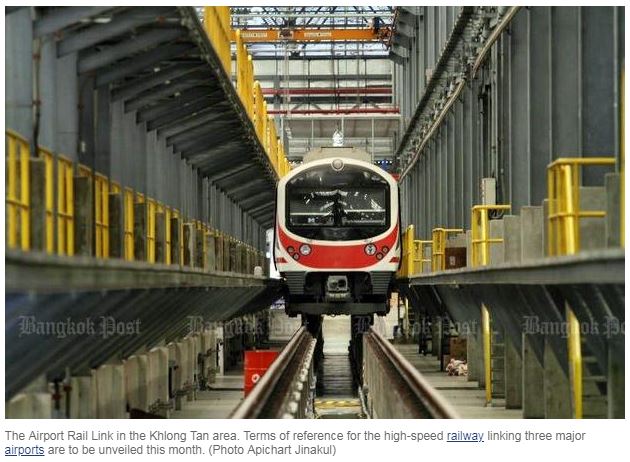Thailand: Making transparent concessions
September marks a series of seismic auctions that will determine whether Thailand’s business realm will continue to be dominated by the same old oligarchs or if newcomers with big bucks could shake up the monopolistic arena.
The terms of reference (ToR) for the 200-billion-baht high-speed railway linking three major airports — Don Mueang, Suvarnabhumi and U-tapao — to serve the government’s much- touted Eastern Economic Corridor (EEC) scheme are set to be unveiled this month.
On the retail front, Suvarnabhumi’s duty-free contract, held by King Power International Group, is set to expire in September 2020. In the energy sector, qualified bidders for the Erawan and Bongkot gas blocks in the Gulf of Thailand are required to submit their proposals near the end of this month.
At the forefront of the auctions are serious questions: how can the auction models ensure transparency, and can the government halt the cycle of monopolies capturing all the benefits?
INTEGRITY PACT
A total of 31 firms have expressed interest in bidding for the high-speed train project to connect two major airports, Suvarnabhumi and Don Mueang, with U-tapao in Rayong province.
The ToR documents have been bought by 31 companies from seven countries.
The EEC is expected to announce the winning bid in January 2019, and the project is scheduled to begin operations in five years.
The State Railway of Thailand (SRT) has already submitted a letter to the Anti-Corruption Organisation of Thailand (ACT) requesting observers for the bidding process.
Observers from the ACT would be allowed to observe and witness the bidding process of the planned infrastructure projects.
The integrity pact is a multi-party agreement entered into by a public body seeking to procure goods and services of significant value. Companies interested in bidding to supply the goods and services, and a third-party organisation such as a civil society organisation that will have a role in monitoring compliance, also enter the pact.
According to Kanit Sangsubhan, secretary-general of the EEC Office, the bidding process for the high-speed railway project that will link the three airports on a 220- kilometre route is designated as the first project to allow observers from the ACT.
“The government aims to create a standard for the development of important infrastructure projects, especially those in the EEC,” Mr Kanit said.
According to Mr Kanit, it’s unnecessary to conduct an integrity pact for projects developed under the public-private partnership (PPP) because the integrity pact aims to enhance the role of the private sector in observing the procurement process as required by the Government Procurement and Supplies Management Act, effective since August 2017.
Mr Kanit insisted, however, that the EEC Office will apply the integrity pact to all significant infrastructure projects to ensure utmost transparency for the public.
Deputy Prime Minister Somkid Jatusripitak reiterated that the government pledges to ensure maximum transparency in the bidding processes for all large-scale infrastructure projects.
“The government has already ordered all responsible agencies to conduct the bidding processes for infrastructure projects, based on maximum transparency and receptiveness,” he said.
Kalin Sarasin, chairman of the Thai Chamber of Commerce, said the government has agreed under the integrity pact to let the private sector dispatch representatives to observe the state bidding and procurement process, adding that private observers will receive thorough training, not only in engineering, but also architecture and accounting, to ensure transparency.
If the bidding process is found to lack transparency, the private sector will exercise protest measures and will walk out of the pact if the protest falls on deaf ears, he said.
“Resignation is considered a serious expression,” Mr Kalin said. “And we pledge to proceed with complaints to the National Anti-Corruption Commission.”
LUCRATIVE DUTY-FREE
The auction for the concession to operate the duty-free zone at Suvarnabhumi airport is edging closer, with the draft ToR by Airports of Thailand (AoT) scheduled to be finalised some time this month.
While the auction’s ToR details remain unknown, the general public and academics have voiced concerns over the transparency of the bidding process and chewed over which concession-awarding models are best suited to the country’s main airport.
The bidding might come in the form of either a master concession or multiple concessions. For observers, given the expansions done on Suvarnabhumi airport over the past decade, and with another major expansion under way, granting the concession to only one operator to manage the entire duty-free zone, as King Power International is doing, does not seem to be necessary, nor the best option.
As one of the world’s busiest airports, Suvarnabhumi airport received about 57 million passengers last year. When the third phase expansion is completed in 2021, it will be able to handle as many as 90 million passengers a year.
Allowing one company to control the duty-free business could also breach the Trade Competition Act of 2017, as pointed out by academics at a seminar on good practices for the duty-free business held at the Faculty of Law at Chulalongkorn University.
The proper way to ensure a transparent bidding process is to add neutral bodies such as those from the Anti-Corruption Organisation to have a say or observe the bidding procedure, similar to auctions of major investment projects of the government.
Speaking at the seminar, Asst Prof Nualnoi Treerat, director of the Asian Studies Institute, said an efficient auction model should promote competition and draw more players into the field to create a sense of fair play, which will eventually benefit both concessionaires and granters.
More than one player in the market will widen the opportunities for duty-free operators to sell products to travellers.
Having a single operator with no competition has made Suvarnabhumi airport less attractive for shoppers, said Asst Prof Nualnoi, noting that the sales volume at Suvarnabhumi airport is six times lower than sales generated from South Korea’s Incheon airport, despite similarities in size and passenger arrival numbers.
Academics have also called for the Finance Ministry to play an active role in drafting the ToR, as the duty-free operating zone falls under customs regulations.
AoT president Nitinai Sirismatthakarn said the airport operator is considering the pros and cons of the two major concession-awarding options, a master concession and multiple concessions.
AoT aims to grant a new concession to manage the duty-free zone at Suvarnabhumi airport two years before the concession contract, held by King Power, expires in September 2020.
Mr Nitinai said AoT is mulling whether the duty-free zone in Terminal 2 will be included in this auction round or not.
 The study by the Thai Retail Association proposes that the concession come with multiple concessions by category format, allowing more players to run duty-free shops and avoiding creation of a monopoly.
The study by the Thai Retail Association proposes that the concession come with multiple concessions by category format, allowing more players to run duty-free shops and avoiding creation of a monopoly.
The association believes that having more operators will increase higher revenue to AoT, which receives concession fees ranging from 17% to 19%, much lower than the average 30% at other international airports.
The study also suggests shortening the concession period to 5-7 years instead of 10 years, the period AoT had granted to King Power. The 10-year concession ran from 2005 to 2015 and has had four two-year renewals.
Several retailers and companies have expressed interest in the duty-free business, including Central Group, The Mall Group, South Korea’s Lotte and Bangkok Airways Plc, as well as existing concessionaire King Power.
Asst Prof Pacharasut Sujarittanonta of the Economics Faculty at Chulalongkorn University said AoT should devise an innovative bidding method similar to what the National Broadcasting and Telecommunications Commission used during bidding for the wireless spectrum, by setting a pre-qualification process before having qualified bidders compete against each other. The method generated high income for the NBTC.
But Asst Prof Pacharasut noted that only an efficient and transparent bidding process will promote participation among bidders and result in higher income to the granter.
Prime Minister Prayut Chan-o-cha pledged recently that the duty-free concession bidding would be transparent and would not favour any business group in particular.
Ambiguous practices were applied in the past, the premier said, and this must be fixed to assure the public that the new bid process will abide by the law and is transparent.
ENERGY EMPOWERMENT
All four bidders vying for the auction of the two gas blocks must submit their auction proposals on Sept 25. The upcoming auction consists of major exploration and production (E&P) companies submitting documents for the Erawan and Bongkot gas blocks after passing the pre-qualification process.
Three of them are existing operators — Chevron Thailand Holdings Erawan, PTTEP Energy Development and Total E&P Thailand — while Mubadala Petroleum Co is the new kid on the bidding block.
Chevron, PTTEP and Mubadala will join the auction for both gas blocks — Erawan (G 1/61) and Bongkot (G 2/61) — while Total will join only the Erawan auction.
The Department of Mineral Fuels under the Energy Ministry is the regulator for the auction and E&P activities.
Deputy director-general Sarawut Kaewtathip said the four qualified bidders will submit their auction proposals and the department will take three months to reach a conclusion.
The winning bidders for the two gas blocks will be announced in December, and production sharing contracts (PSCs) will be signed with the government next February.
Although this gas block auction is a colossal project and has attracted interest from many companies, both the ministry and the department are confident that all auction processes will be free of special interests.
“E&P activities need a lot of expertise from bidders and have to invest a massive budget for each drill site,” Mr Sarawut said.
The concessions of the Erawan and Bongkot gas blocks will expire in 2022 and 2023, respectively. The two gas blocks are located in the Gulf of Thailand.
The blocks have been fundamental to the country’s economic development for more than three decades. Wet gas from the two fields is the main resource for the petrochemical industry and has brought Thailand to the forefront of petroleum production facilities, as seen in Rayong’s Map Ta Phut Industrial Estate.
Thailand started drilling activities in 1971, and the first gas production commenced in 1981.
Gas production volume over the next decade is projected at 1,500 million standard cubic feet per day (MMSCFD), estimated from the current gas reserve of 2,200 MMSCFD.
Mr Sarawut said the PSC is the most crucial point. The department has set a condition that the winners will have to offer gas prices that do not exceed the market price, and the profit-sharing ratio with the state cannot be less than 50%, including special benefits and bonuses.
The PSC form will be used for this auction for the first time, replacing the concession model imposed since 1971.
At this moment, none of the four companies has revealed any intention of teaming up for the auction.
PTTEP president Phongsthorn Thavisin said his company is in talks with Chevron. If Chevron wins the concession for the Erawan field auction, PTTEP will increase its stake in the gas block by more than 10% from 5% under the current concession.
On the other hand, Chevron Thailand president Pairoj Kaweeyanun said it’s quite difficult to comply with the department’s conditions for the upcoming auction because the gas fields have reached peak production.
“Massive capital expenditure will be needed to maintain gas production volume,” Mr Pairoj said. He has yet to reveal who Chevron’s business partners will be for the auction.
Round 21, put off since 2007, “will be ready to provide E&P licences across Thailand”, Mr Sarawut said.
Source: https://www.bangkokpost.com/business/news/1532922/making-transparent-concessions


 English
English




